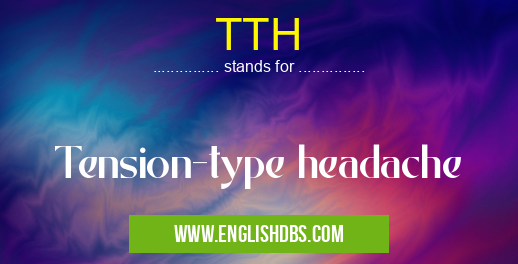What does TTH mean in MEDICAL
TTH stands for Tension-type headache, the most common type of headache, characterized by a constant, dull, aching pain in the head. It typically feels like a tight band or pressure around the head.

TTH meaning in Medical in Medical
TTH mostly used in an acronym Medical in Category Medical that means Tension-type headache
Shorthand: TTH,
Full Form: Tension-type headache
For more information of "Tension-type headache", see the section below.
Causes
The exact cause of TTH is unknown, but it is thought to be related to muscle tension in the head, neck, and shoulders. Triggers may include:
- Stress
- Anxiety
- Fatigue
- Poor posture
- Eye strain
- Caffeine or alcohol withdrawal
Symptoms
TTH can vary in intensity and duration, but typically lasts from 30 minutes to several hours. Symptoms may include:
- Dull, aching pain
- Pressure or tightness around the head
- Tenderness of scalp, neck, or shoulders
- Mild nausea
- Sensitivity to light or sound
Treatment
Most TTH can be managed with self-care measures, such as:
- Relaxation techniques
- Over-the-counter pain relievers
- Heat or cold therapy
- Massage
If self-care measures do not provide relief, medical treatment may be necessary, which may include:
- Prescription pain relievers
- Muscle relaxants
- Botox injections
Essential Questions and Answers on Tension-type headache in "MEDICAL»MEDICAL"
What is a tension-type headache (TTH)?
TTH is the most common type of headache, characterized by a mild to moderate pain that feels like a tight band or pressure around the head. It typically lasts for 30 minutes to several hours and can occur on both sides of the head.
What causes TTH?
The exact cause of TTH is unknown, but it is thought to be related to muscle tension in the head and neck, as well as stress and anxiety. Certain triggers, such as poor posture, eye strain, and lack of sleep, can also contribute to TTH.
How is TTH diagnosed?
TTH is diagnosed based on the patient's description of their symptoms and a physical examination. Your doctor will ask about the location, severity, and duration of your headaches, as well as any potential triggers.
How is TTH treated?
Treatment for TTH typically involves lifestyle modifications, such as improved posture, regular exercise, and stress management techniques. Over-the-counter pain relievers, such as ibuprofen or acetaminophen, can also help relieve pain. In some cases, your doctor may prescribe stronger medications or physical therapy to address muscle tension.
Can TTH be prevented?
While it is not always possible to prevent TTH, there are steps you can take to reduce the frequency and severity of your headaches. These include maintaining good posture, getting regular exercise, managing stress effectively, and avoiding potential triggers.
When should I see a doctor about TTH?
You should see a doctor if your TTH headaches are severe, persistent, or accompanied by other symptoms, such as fever, nausea, or changes in vision. These may be signs of a more serious underlying condition.
Final Words: TTH is a common and often debilitating condition, but it can be effectively managed with self-care and medical treatment. Early recognition and proper management can help reduce pain and improve quality of life.
TTH also stands for: |
|
| All stands for TTH |
